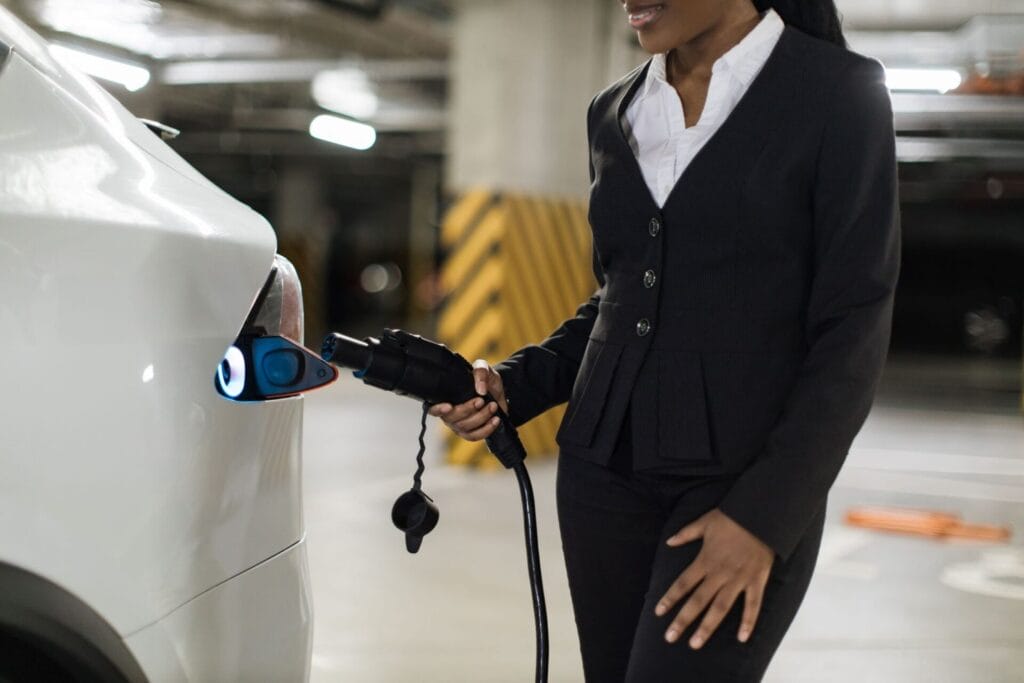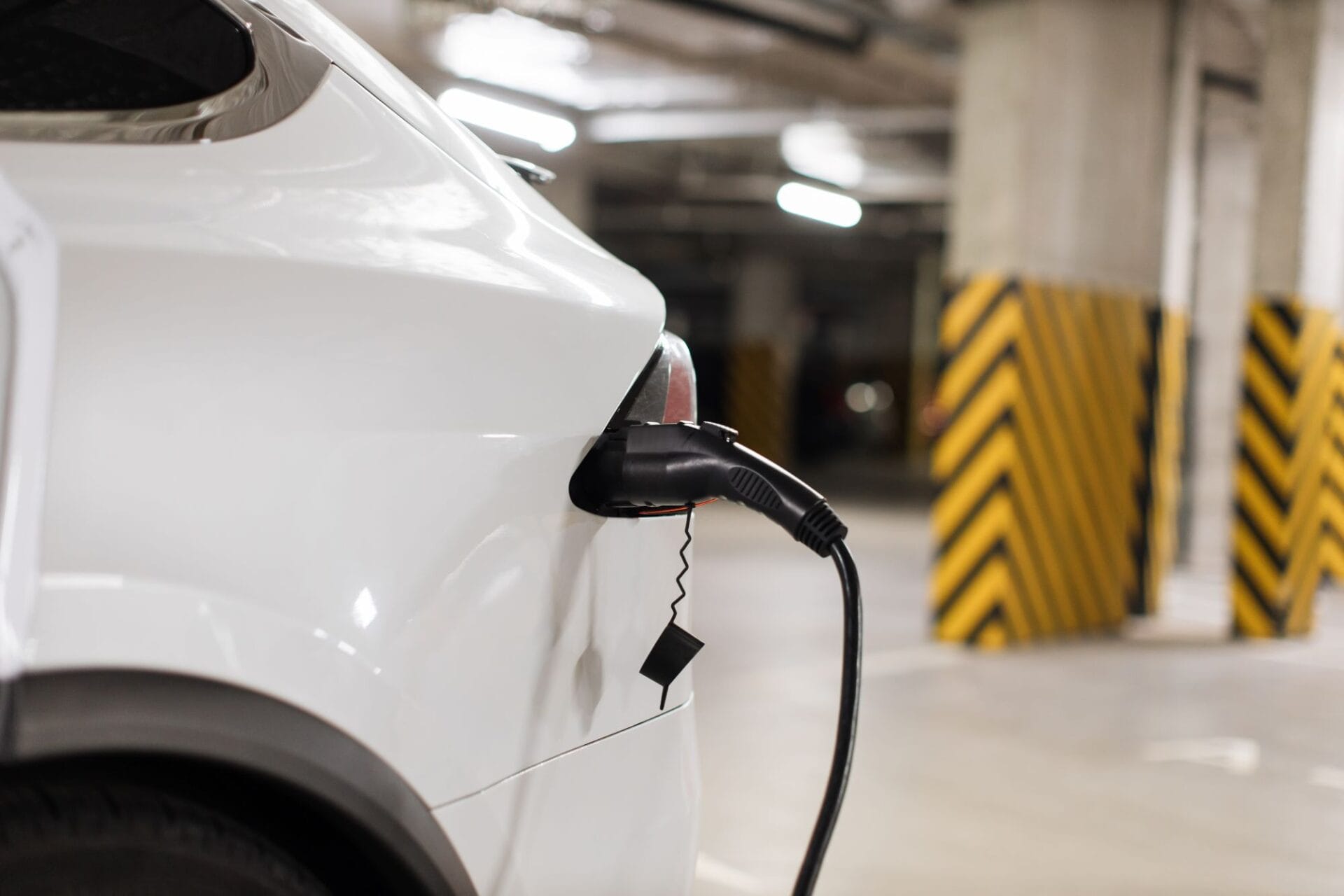While we still don’t have flying cars, we do have vehicles that can operate without gasoline. Tesla EVs look and sound futuristic, and even if they can’t fly, they are working on self-driving capabilities.
It’s not just Tesla that is delivering cool resource-conscious vehicles to the public. Big car companies like Ford and Volkswagen are now selling high-quality EVs at relatively affordable prices.
Download our free EV charging policy template
In Canada, more than 65,000 battery electric vehicles (BEVs) and plug-in hybrid electric vehicles (PHEVs) were registered in the second quarter of 2024, reports Statistics Canada. That amounts to nearly 13% of all new vehicle registrations. That number was just 3.4% over the same period five years ago.
Combined U.S. sales of hybrid vehicles, plug-in hybrid electric vehicles, and battery electric vehicles (BEVs) amounted to 18.7% in the second quarter of 2024, according to estimates from Wards Intelligence.
Table of contents
- The majority of condos and apartments don’t accommodate EVs
- Condos may allow owners to install an EV charger, but it’s not cheap
- Other considerations
The numbers are still modest, but they provide clear evidence that people are willing to buy electric cars if they are affordable.
But, there is one very big issue which may be slowing sales by a lot. The lack of charging infrastructure creates big headaches for EV owners, especially if they live in a condo or apartment building.
The majority of condos and apartments don’t accommodate EVs
According to one study, homeowners are three times more likely than renters to own an electric vehicle. A different analysis of California EV drivers found that 80% lived in single-family, detached homes.
No big surprises here. Electric cars need to be charged, and without access to a home charger, maintaining an EV car is incredibly inconvenient.
EV drivers can probably have a charger installed in their parking garage, but it’s not cheap
Few groups are outright opposed to green initiatives, and some states and provinces are advocating for more zero-emission vehicles on the road. For example, the Connecticut Hydrogen and Electric Automobile Purchase Rebate Program (CHEAPR) offers rebates of up to $5,000 toward the cost of purchasing or leasing an EV.
In British Columbia, drivers can take advantage of federal and provincial incentives to support the purchase of electric vehicles.
Laws are even being created to ensure new multifamily buildings can accommodate charging stations. Illinois’ EV Car Charging Act states that a new (small) multifamily residence shall have “at least one EV-capable parking space for each residential unit that has dedicated parking, unless any subsequently adopted building code requires additional EV-capable parking spaces, EV-ready parking spaces, or installed EVSE.”
Many EV drivers will find that their condominium will support the installation of a charging system, but the onus is on them to pay and arrange for the installation of the charger.

A charger costs $10,000 to buy and install
At the time this article was published, a charger costs anywhere from $5,000 to $10,000 (CAD), depending on several factors including whether the condominium is already set up for EV charging and how many stations are going in at one time.
The type of charger also impacts costs. The price range for a Level 2 charging station is around $3,000 or more, depending on the specifications and build quality. Level 2 charges can get an EV 80% charged in about six hours.
Level 1 EV chargers are priced at about $1,000, but these systems are generally intended for personal use, and key features required to monitor usage and connect to a network are not included. It also takes a full day to charge an EV with a Level 1 system.
Level 3 chargers are the most efficient, but also cost the most. For $50,000, an EV can fuel up in 45 minutes or less.
Rebates
Are installation rebates available? Yes, but the owner or owners who want the charging station will likely be the ones searching and applying for them.
Condos, stratas, and apartments in British Columbia may be eligible for a rebate of up to $1,400 per charger, to a maximum of $14,000, for Level 2 networked EV chargers. A rebate of up to $600 per parking stall, to a maximum of $120,000 may be awarded for the installation of electrical infrastructure.
Numerous California companies will provide modest rebates to multi-family buildings that install Level 2 chargers.
Don’t forget about paying for energy
Condo owners still have to pay for the energy they use to power their vehicles. Costs can be calculated in a number of ways.
Individual metering – Owners are billed for the electricity they use. The meters track how much energy each owner uses.
Subscription service – Condos may offer subscription-based services where owners pay a monthly fee for access to the charging station.
Pay-per-use – Owners pay for the electricity the way they would pay for gas. This could be accomplished using a mobile app or RFID card.
Third-party billing – Some charging networks or service providers offer billing solutions that allow owners to link a payment method to their charging accounts. The provider bills users directly.
Other considerations
Laws and governing documents
Current laws, and the condominium’s governing documents, will help owners assess how easy or difficult it may be to have a charging station installed.
Some states and provinces have “right-to-charge” legislation which requires associations or landlords to allow residents to install Level 1 or Level 2 charging systems.
Residents can also reach out to their landlords or the board to discuss the feasibility of installing charging infrastructure.
If “right-to-charge” legislation does not exist in your state or province, then your governing documents may prevent the installation of charging stations.
Alternatively, residents may be asked to meet certain requirements, including providing information about how power will be supplied to the charging station and what company they intend to hire, in addition to obtaining proper insurance coverage.
Timing
Even if a charging system is approved by a condo board, and even if the owner (or owners) can successfully obtain a rebate for the EVCS, it could take an entire year before the charging station is ready to use. Timing will depend on how big the project is, how responsive the board is, and the age of the condo. Older buildings were not designed with EVs in mind, so the installation project would be more complex.
If you are in the process of buying an EV, or already have one, make sure you have a backup charging plan if the building you live in or are moving to does not currently have a charging station.
Conclusion
It is possible to own an electric vehicle if you live in a condominium or apartment, but you may want to assess your charging situation before making such a big investment.
Developers are aware that charging stations are valuable and desirable amenities, and many newer buildings have stations built into the parking garages. At the very least, new builds will likely be EV-ready, meaning it will be fairly easy to install a charging station if an owner requests one.
But owners who live in older buildings must be prepared to do a lot of work if they want a charging station installed. The process will be easier to navigate if there is a group of owners and/or residents willing to collaborate. They can share the workload, and the costs.
























